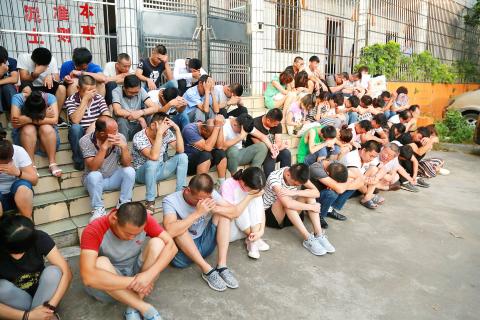China’s latest crackdown on pyramid schemes was prompted by three shocking deaths: one young man who was beaten, another who was found dead in a pond and a third left to die on a road.
Like elsewhere in the world, the scams have proliferated in China as fraudsters trick people into thinking they can become rich quickly.
Members are charged a joining fee and required to recruit new investors with promises of high returns.

Photo: AFP
However, the three deaths in July put a spotlight on more extreme tactics used by some organizations in China, where the schemes can raise large amounts of money.
Warning that pyramid schemes have become “more rampant,” four Chinese government agencies responded last month by launching a three-month crackdown that targets misleading online job adverts designed to lure young people.
Many of those who sign up online to promises of easy riches discover a harsh reality in which they are faced with intense demands, harassment or even physical abuse.
Pyramid schemes in China were criminalized in 2005, but are still booming, with authorities investigating more than 2,800 cases last year, a 20 percent increase from 2015.
An official from the government’s anti-pyramid scheme department said that there are “too many” scams and investigating them requires a lot of resources.
“Especially nowadays, many pyramid scheme organizations move their base to the countryside and develop members through the Internet, making it harder to monitor them and obtain evidence,” the official said.
In a surprising additional challenge, hundreds of members of a pyramid scheme in July held a demonstration in Beijing to protest against an investigation into their group, known as Shanxinhui (善心匯) or “philanthropic exchange.”
Scores have been detained.
Many pyramid schemes operate in cramped spaces where people eat together and sleep on the floor, said Li Xu (李旭), the founder of an organization that rescues people who become trapped.
The organizations that resort to violence do so to intimidate members into not reporting them to the police, he said, adding that the crackdowns have made it more difficult to recruit people.
“They are also afraid that newcomers will call the police. So they take away their mobile phone, control the newcomers by illegal detention and other violent means in order keep more people,” he said.
Li formed the China Anti-Pyramid Promotional Association after he was fooled into joining one himself more than a decade ago.
“Pyramid schemes in China target people who desire to change their life at a low cost,” he said.

Intel Corp chief executive officer Lip-Bu Tan (陳立武) is expected to meet with Taiwanese suppliers next month in conjunction with the opening of the Computex Taipei trade show, supply chain sources said on Monday. The visit, the first for Tan to Taiwan since assuming his new post last month, would be aimed at enhancing Intel’s ties with suppliers in Taiwan as he attempts to help turn around the struggling US chipmaker, the sources said. Tan is to hold a banquet to celebrate Intel’s 40-year presence in Taiwan before Computex opens on May 20 and invite dozens of Taiwanese suppliers to exchange views

Application-specific integrated circuit designer Faraday Technology Corp (智原) yesterday said that although revenue this quarter would decline 30 percent from last quarter, it retained its full-year forecast of revenue growth of 100 percent. The company attributed the quarterly drop to a slowdown in customers’ production of chips using Faraday’s advanced packaging technology. The company is still confident about its revenue growth this year, given its strong “design-win” — or the projects it won to help customers design their chips, Faraday president Steve Wang (王國雍) told an online earnings conference. “The design-win this year is better than we expected. We believe we will win

Chizuko Kimura has become the first female sushi chef in the world to win a Michelin star, fulfilling a promise she made to her dying husband to continue his legacy. The 54-year-old Japanese chef regained the Michelin star her late husband, Shunei Kimura, won three years ago for their Sushi Shunei restaurant in Paris. For Shunei Kimura, the star was a dream come true. However, the joy was short-lived. He died from cancer just three months later in June 2022. He was 65. The following year, the restaurant in the heart of Montmartre lost its star rating. Chizuko Kimura insisted that the new star is still down

While China’s leaders use their economic and political might to fight US President Donald Trump’s trade war “to the end,” its army of social media soldiers are embarking on a more humorous campaign online. Trump’s tariff blitz has seen Washington and Beijing impose eye-watering duties on imports from the other, fanning a standoff between the economic superpowers that has sparked global recession fears and sent markets into a tailspin. Trump says his policy is a response to years of being “ripped off” by other countries and aims to bring manufacturing to the US, forcing companies to employ US workers. However, China’s online warriors